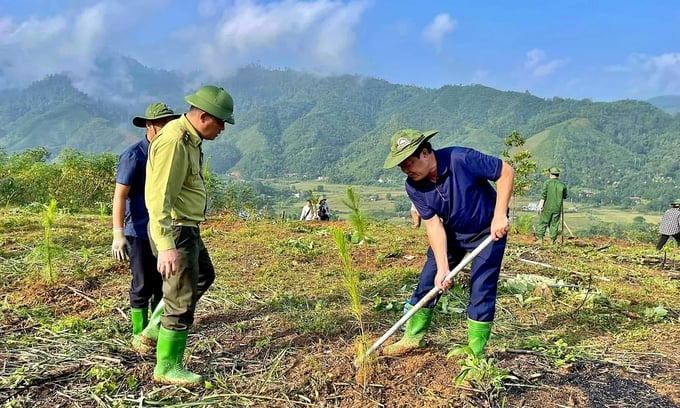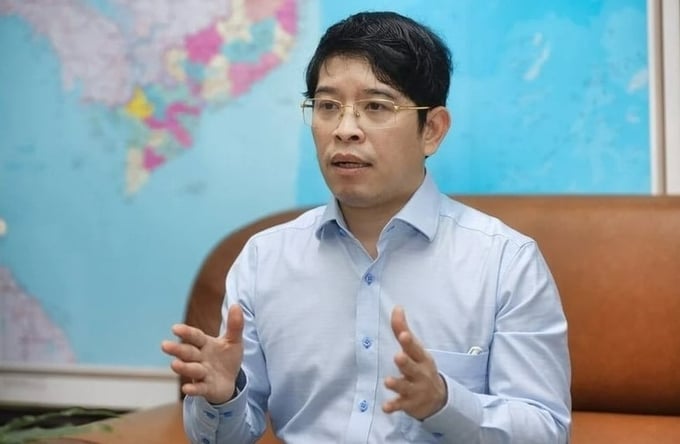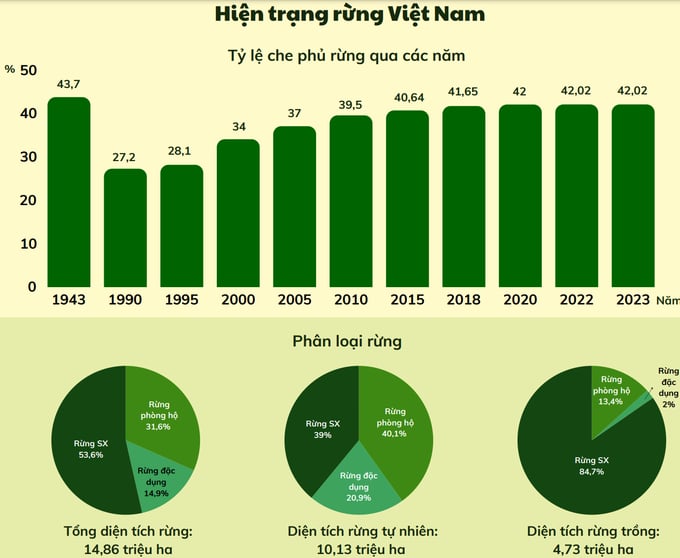June 15, 2025 | 23:10 GMT +7
June 15, 2025 | 23:10 GMT +7
Hotline: 0913.378.918
June 15, 2025 | 23:10 GMT +7
Hotline: 0913.378.918

Alongside agriculture, forestry is considered to have a significant impact on Vietnam's Net Zero goals. Photo: Bao Thang.
In 2023, Vietnam successfully transferred 10.3 million forest carbon credits under the Emission Reductions Payment Agreement for six North Central provinces in collaboration with the World Bank. This achievement stems from Vietnam's early preparation for agricultural emission reduction pathways, which began in 2014. Six years later, Vietnam signed an agreement with the World Bank, subsequently establishing the legal framework through Decree No. 06/2022/NĐ-CP and selling its first carbon credits in the following year.
Mr. Nguyen Dinh Tho, Director of the Institute of Strategy and Policy on Natural Resources and Environment (under the Ministry of Natural Resources and Environment), noted that the carbon market is relatively new to Vietnam. As such, the government, ministries, and regulatory agencies have adopted a cautious approach toward carbon credits.
However, Mr. Tho emphasized that in the long term, failing to tap into this market could lead to wasted resources, particularly for a country like Vietnam, which has significant potential for carbon credits. Forestry, for instance, would naturally absorb CO2 without generating economic value if the market is not leveraged.
"We have calculated that it takes an average of 12 to 18 months to complete the foundation and legal procedures for a carbon project. After that, it takes an additional three years for inventory and another three to five years before carbon credits can be traded", Mr.Tho explained. This timeline aligns with Vietnam's experience transferring 10.3 million carbon credits from the North Central region, a process spanning nearly a decade from initial research to financial returns.
Currently, Vietnam participates only in the voluntary carbon market, where carbon credits are priced lower. This approach aims to attract international support and contribute to the country's Nationally Determined Contributions (NDCs) under global climate efforts.
From Tho's perspective, the primary goal of the NDC commitment is emission reduction rather than carbon credits. He cautioned that if Vietnam limits itself to the voluntary market, its competitiveness in the international trading market will remain low. Moreover, farmers, the primary generators of carbon credits, will have less motivation and fewer resources to pursue sustainable development goals.
"Connecting the voluntary and compliance markets is crucial. If Vietnamese carbon credits increase in value on the mandatory market, regulators will have more tools to encourage farmers to produce and improve their income. Being overly cautious could mean missing opportunities," Mr. Tho remarked.
Regarding the NDC contributions, Mr. Tho pointed out that the current bottleneck lies in the lack of a legal framework and clear, transparent policies. These are necessary for stakeholders transitioning to low-carbon energy, technology, and consumption methods to capitalize on market opportunities.

According to Nguyen Dinh Tho, Director of the Institute of Strategy and Policy on Natural Resources and Environment, it takes approximately 10 years to complete a carbon project. Photo: Bao Thang.
Compared to regional countries like Thailand and Singapore, which have made significant investments in carbon credit trading markets, Vietnam is currently lagging behind. Even if an investor were interested in participating, they would not find a benefit-sharing mechanism outlined in Vietnam’s legal framework.
Acknowledging this reality, Mr. To Xuan Phuc, an expert from Forest Trends, added that an increasing number of organizations and individuals are eager to engage in the carbon market. This stems from both the global mandate to reduce emissions and the potential opportunities for a forest-rich country like Vietnam.
In the current context, Mr. Phuc suggested that developing the domestic carbon market is a more feasible approach. Businesses in sectors such as agriculture and energy could invest in technologies that simultaneously reduce emissions and create additional financial resources, fostering sustainable agriculture and green development.
The government has tasked the Ministry of Natural Resources and Environment with leading the development of a roadmap for Vietnam to operate a nationwide carbon credit trading platform by 2028. Ha Cong Tuan, former Permanent Deputy Minister of the Ministry of Agriculture and Rural Development (MARD), who was directly involved in selling Vietnam's first carbon credits to the World Bank under the emission reduction agreement in the North Central region, outlined five key tasks for the coming period.
Among these, Mr. Tuan emphasized the state’s role in creating a policy framework to both stimulate domestic enterprises and increase societal engagement in reducing greenhouse gas emissions.
“From now, we must consider an independent consultation and monitoring mechanism. Relying solely on the state will take too much time,” Tuan remarked. He also suggested that emission measurement and monitoring could be socialized, expanding to include inputs from the private sector. This approach would not only accelerate progress but also enhance Vietnam’s credibility with international stakeholders.

Current state of Vietnamese forests. Photo: DOF.
Statistics from the Forestry reveal a significant disparity between the voluntary and compliance carbon markets. Globally, the voluntary market is valued at approximately USD 2 billion, while the compliance market exceeds USD 900 billion. The average price of a carbon credit in the voluntary market is around USD 5.09, whereas in the compliance market, prices vary widely. For instance, in the EU, the average price reaches USD 79 per credit, while in South Korea, it is only USD 10. The compliance market also comes with numerous and stringent standards for carbon credits.
Another factor to consider is the declining value of carbon credits over time. For example, a credit generated before 2016 lost about half its value by 2018. By 2021, such credits retained only 10% of their original value and dropped to zero in 2022.
Beyond the North Central region, which successfully transferred 10.3 million credits, Vietnam has two other high-potential regions: the South Central Coast and the Central Highlands. These regions are estimated to achieve net emission reductions of approximately 36 million and 27 million tons of CO2, respectively.
Mr. Nguyen Dinh Tho, Director of the Institute of Strategy and Policy on Natural Resources and Environment, emphasized that agriculture and forestry play a pivotal role in Vietnam's emission reduction efforts. “The sustainable development of agriculture and forestry will significantly determine whether we can meet international emission reduction commitments, specifically achieving Net Zero by 2050, as well as advancing green development in the near future," he stated.
Between 2021 and 2025, Vietnam aims to generate 25 million tons of carbon credits, all of which will contribute to its Nationally Determined Contribution (NDC) targets.
Currently, Vietnam has about 6 million surplus carbon credits from the North Central region's emission reduction agreement. The World Bank has proposed transferring an additional 5 million credits.
Translated by Kieu Chi

(VAN) The working delegation from the Ministry of Agriculture and Environment conducted an important trip to the Netherlands to strengthen strategic partnerships and sustainable development in the agricultural sector.

(VAN) The letter ‘A Plea from the Ocean’ not only evokes emotion but also awakens the human conscience to the responsibility of protecting life on Earth.

(VAN) The Department of Agriculture in South Africa has announced the country’s first mass vaccination of poultry to prevent local birds from contracting avian influenza.

(VAN) Establishment of the Mekong Delta Regional Agricultural Linkage Center, aiming for a closed value chain, deep processing, trading platforms, and international market connectivity.

(VAN) Gia Lai province has recently recorded 460 rare species of animals and plants, contributing to forest conservation and biodiversity planning in the region.

(VAN) Ms. Caroline Beresford, New Zealand Ambassador to Vietnam, expressed confidence that agricultural cooperation between Vietnam and New Zealand will develop sustainably, be climate-resilient, and promote gender equality.

(VAN) Vietnam reaffirms its commitment to international cooperation in fostering sustainable and responsible fisheries while ensuring resilient livelihoods for small-scale fishing communities.